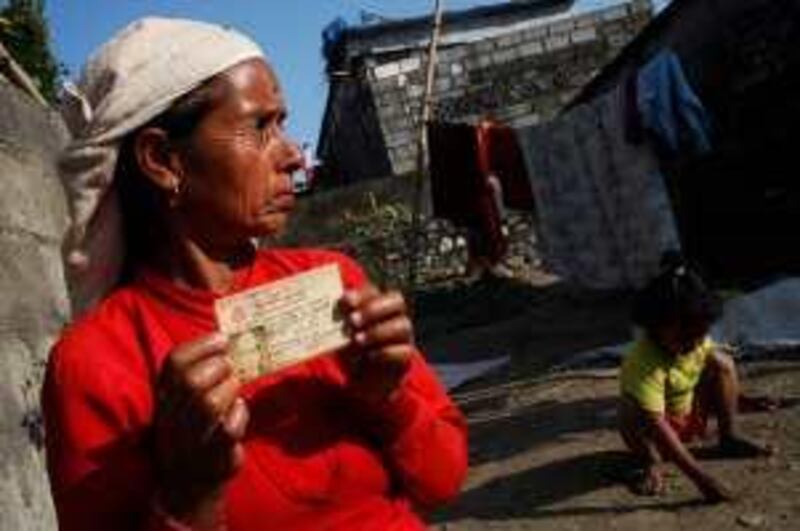POKHARA, NEPAL // The last memory Jamuna Baral has of her husband is of him standing in the alleyway outside their two-room shack in Pokhara, West Nepal, saying goodbye to their children. A day later, she said, while he was drinking tea at a nearby roadside restaurant, the Nepalese army bundled him into the back of a car and he was never seen again. That was more than six years ago, at the height of a decade-long civil war between Maoist insurgents and an army loyal to the Nepalese royal family. Today, more than two years after peace broke out, Mrs Baral is still waiting to find out what happened to her husband, whom she later learned was the chairman of the Maoist Slum People's committee for the area where she still lives. "After the accord was signed I was optimistic he would come home and the children would have a father again," she said, with tears rolling down her face. "Now, I feel that he is not alive."
Chaman Lal Baral was one of thousands of Nepalese who were killed, tortured or made to disappear during the conflict, and human rights groups say the new government's failure to investigate these cases is undermining the chance to forge a lasting peace. "I am not optimistic I'll ever find out the truth," Mrs Baral said. For months after her husband disappeared she and her three children walked and hitchhiked between various army barracks trying to locate him, but she never managed to glean more than rumours as to his whereabouts. According to one such snippet of information, he had been moved to Kathmandu, so she borrowed money to travel there and spent weeks traipsing around the capital's army bases and jails, to no avail. Eventually, however, the trail ran cold.
"If you know someone is dead you are sad, but you can adjust yourself. Without knowing for sure, part of me still feels he may come," Mrs Baral said. The International Committee of the Red Cross (ICRC) says more than 1,200 people are still missing as a result of the conflict. The majority of people who went missing were men aged between 18 and 35. And without clear proof that someone is dead, spouses are not free to remarry or inherit property, leaving families in limbo for up to 12 years when Nepali law recognises a missing person as deceased. Most families, however, just want to know what happened to their loved one for peace of mind, said Jean-Paul Corboz, who heads the ICRC's missing persons programme in Nepal. "Families need to know how they died, where the body is. It is important for the healing process." As part of the deal that ended the conflict in Nov 2006, both sides agreed to the setting up of high-level commissions to look into the disappearances and human rights violations during the conflict. But to date, little has been done. Last month, the government, now led by the Maoists, attempted to bypass parliament and create a disappearances commission by decree. The move was widely criticised by opposition parties and human rights activists. "Without the scrutiny of parliament, the independence of the committee will be called in to question," said Mandira Sharma, a human rights lawyer who has tried to bring cases against both sides. A bill to create a truth and reconciliation commission to investigate human rights abuses, similar to the one created in South Africa after the end of apartheid, has been languishing in the "consultation phase" for two years. Part of the problem is that both sides feel their actions were justified in the context of fighting a war. The Nepalese army, which is widely thought to be responsible for the lion's share of the deaths and disappearances, says it has dealt with those who were responsible for human rights violations. "Some violations did occur, but never as a result of policy. "The individuals who were responsible have been punished in military courts," said Brig Gen Ramindra Chhetri, a spokesman for the Nepalese army. In total, he said, 175 people had been tried, receiving punishments ranging from demotion to 10 years in prison. The Maoists use similar arguments. "It was the people's war, an armed conflict," Dev Gurung, the new Maoist justice minister, said. "There may have been some actions committed by individuals and they will be investigated by the truth and reconciliation committee, as part of the political process." Neither side feels the civilian courts should hear the cases. This failure to provide families and victims with answers or justice may have long-term consequences for the future of this Himalayan nation, which is also struggling to draft a new constitution after it voted to end the 239-year-old monarchy last year. "If we fail to address this, the peace process won't last long," Ms Sharma said. Most worrying , said local human rights groups, is that a culture of impunity has developed, leading to a rise in the number of armed groups in the country and even continuation of torture and abductions to settle old scores. "Not even one perpetrator has come to justice," Ms Sharma said. "People see that if you do something with a political motive, you are not held to account." hgardner@thenational.ae





